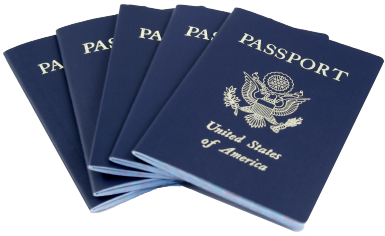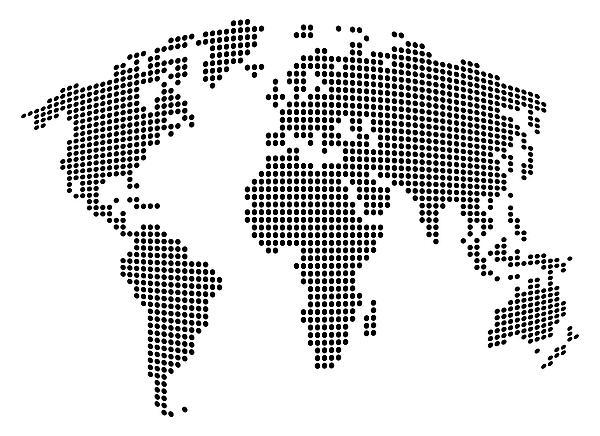We’re committed...
TO PROVIDING YOU WITH TRAVEL INTELLIGENCE!
WORD TRAVEL & TRAVELING ABROAD
GETTING OR RENEWING A US PASSPORT
Eligibility
To have a U.S. passport, you must be a U.S. citizen.
Passport Book and Passport Card
Depending on where you are traveling outside of the U.S., you will need to determine if you need a passport book or a passport card.
A passport book is required for all international travel by air.
To enter the United States at land border crossings or sea ports-of-entry from Canada, Mexico, the Caribbean, and Bermuda, you can use a passport book or a passport card.
A passport card is more convenient and less expensive than a passport book, but it cannot be used for international travel by air.
How to Apply
The application process is the same for either the passport book or card, even if you want both at the same time. You have to go in person to present your application.
From Within the United States
If you need to get a passport in two weeks or less, you will need an expedited process. To find out where you need to go and what additional fees you’ll pay, follow the steps to get a passport quickly.
If you will be traveling in three weeks or more, you can follow the regular application process and apply in person at a passport acceptance facility.
From Outside the United States
Contact the U.S. Embassy or consulate near you for information and forms to request a passport from outside the U.S.
Items You Need to Apply for a U.S. Passport
Application Form - To complete the application for a passport book, card, or both together, first do one of the following:
Fill out the application online. Use the Passport Application Wizard to step through the process of filling out the application. When you’ve completed the application, print it out to take to the passport acceptance facility. Passport applications cannot be submitted online.
Fill out the application by hand. Download the passport application form (DS-11) and instructions (PDF, Download Adobe Reader) and complete the application by hand, or go to a local passport acceptance facility to get a copy to fill out.
Whether you fill it out online or by hand, it is important that you do not sign the form until you are instructed to do so in front of a passport designated official you will meet when applying in person.
Personal documents - You’ll need to bring all of the following:
An original proof of citizenship document
An acceptable photo ID document
A photocopy of the front and back of the photo ID document
Passport photo - Follow the photo requirements.
Payment - Calculate your passport fees.
LEARN WHAT YOU
NEED TO KNOW BEFORE
YOU GO TRAVEL ABROAD
By Edward Michaels
Many of us dream of seeing the world, but are lucky if we ever make it across our own country. Travel can be quite a hassle, but it is a means to an end of experience and adventure.
Leaving the country and going abroad is a different prospect that what you are used to on most trips, but acquiring what you need to know before you go is quite simple.
Some people bring scads of luggage with them when the travel, but this is too cumbersome for the average person. You want to bring only what you will need and traveling light in general will make the experience that much smoother.
When planning outfits think judiciously but you can splurge and bring lots of undergarments and socks. Because most of your days will be spent sightseeing, you would do fine to bring just a few pairs of pants since you can always do your laundry while you're away.
If you limit your pants, you must invariably limit your shoes. What you cannot bring in terms of quantity you should make up for in terms of quality. A good shoe that you walk in for miles and miles for the length of your trip will be one of the best companions on your trip. Outside of your everyday shoe you can pack one or two more pairs that can be considered dressier for nighttime when you're more apt to try some fine dining establishments.
Bring have the amount of tops that you think you would need because you will buy items abroad. Being surrounded by a completely new environment will have you partaking in spontaneous spending sprees - it's just a part of traveling.
In terms of money, we have graduated from the need to carry around exorbitant amounts of cash or traveler's checks. Credit and debit cards are accepted throughout the world now and you can always pull money out of an ATM for a small fee and some of the best exchange rates you will find.
Passports are king when traveling abroad as you cannot do it without one. Keep this document on you at all times, but have something in place in case you lose it or it is stolen. What you can do is photocopy the inside and store that in your luggage. With this extra step you can deal with your embassy in a more fluid and easy way.
What about technology? Everyone thinks they need to bring their phones, but making international calls is extremely expensive. Why tie yourself so completely to constant contact when you can just buy a calling card? These are inexpensive and allow you to use payphones or any phones that are located in your hotel or hostel.
With just a little bit of planning, you can go off on your trip abroad with piece of mind.
Traveling should be about fun and the unknown, so get out there and see what the world has to offer!
20 Things To Do Before Traveling Internationally
1. Make copies of your travel documents
We don't plan on losing our passport while on holidays, but it's a good idea to make some backup copies just in case: one to bring with you and one to leave at home.
2. Print out hard copies of your itinerary and confirmations
Don't assume that WiFi will always be available to pull up your itinerary or travel confirmations - always bring a hard copy with you just in case.
We cannot tell you how many times hotels have made a mistake in your reservations and tried to overcharge you. Having a hard copy handy will be in your favor.
Also put a copy of your contact information and itinerary in your luggage just in case it gets lost, so the person who retrieves it will know how to contact you. You can also include this information on your luggage tag.
3. Check for travel advisories / register your trip
Depending on where you travel to, there may be unexpected travel advisories that you should be aware of. Sometimes your travel or health insurance may not be valid if there is a current travel advisory.
You can also register your trip with your country's embassy so they'll know where you'll be just in case of an emergency.
4. Call your bank
Before you leave, it's important to call your bank (the number on the back of your bank card) to let them know that you'll be traveling. This allows you to use your card to make purchases while abroad.
5. Have some emergency cash on hand
Just because you have your bank cards available, doesn't mean that they will be accepted at every establishment. It's good to have some extra cash on hand in the local currency, especially for smaller purchases.
6. Determine what documents you need to enter the country
Most countries require a passport that is valid for six months or more after your return date. You may also require a visa or special documents to enter the country as well.
7. Check with your doctor or insurance provider
Before traveling, it's best to check with your doctor or insurance provider to see if you will require any prescription medications or vaccines before your trip.
You may also require a note from your doctor to allow you to bring certain prescription medications into the country.
8. Research what you can / cannot bring inside the country
The last thing you want to do is to arrive at your destination and find out that some of the items you packed are not allowed into the country. This could be seeds or certain food. Check ahead to avoid any unnecessary disruptions.
9. Check the weather forecast before leaving
I like to do this about a week before, then just a day before to make sure that I pack appropriately. If it's cold at home but you're traveling to a warm climate, chances are you don't need to bring a heavy jacket.
Also, rain may pop up in the forecast which means you'll need an umbrella. Check ahead so you can pack accordingly.
10. Research local customs and etiquette where you're visiting
It's always a good idea to read up a little on the local customs, culture and etiquette so you will know what to expect while traveling internationally.
Sometimes a hand gesture in one country may carry a different meaning in another country; you may need to dress more conservatively than you would back home; tipping policies may vary too - either way, you don't want to do something silly that could have been avoided if you did your research beforehand.
11. Research events and festivals happening while you're in town
Knowing if there are any major events happening while you're in town is good to know. You may want to attend a concert, a festival or just in general, be aware of what's taking place in the city.
12. Flip through guide books
I know some travelers prefer not to consult with travel books, but I always like to flip through them to get tips, see what sights or attractions are worth visiting, etc.
Many of them also include maps of the different neighborhoods in the city, so it gives you a better understanding of the layout of the city. If you don't want to invest in a guidebook, you can borrow one for free from your local library.
13. Get adapters / converters for your electronic devices
This should be self-explanatory, but not every country has the same voltage. You can always pick one up from the airport if you forget, but you will pay more there. Instead, I recommend picking up a world travel adapter before your trip.
14. Learn a few key phrases in the local language
One of the best things you can do is to learn at least one keyword or phrase in the local language. Even if you don't sound like a native, the locals will still appreciate your efforts.
I noticed that this was especially true while I was in Paris. Even though I could only say a few words, I could tell they appreciated that I tried to communicate with them in French first before switching to English.
Also, don't assume that everyone knows English, because this is not the case. Once you step outside of the main tourist spots, fewer and fewer people speak English.
15. Watch a video on how to use the city's public transit system
Most metropolitan cities are equipped with a decent public transit system. Instead of paying the high price for taxis, try learning how to use the city's public transit. You'll save money and get around town quicker than by car.
If you do decide to hire a car, check ahead to see if you require an international driver's license.
16. Determine a plan for your mobile phone
Whenever I leave the country, I always turn off my mobile data and switch to airplane mode. I use the city's WiFi to make calls and text using apps like Whatsapp and Facebook Messenger.
If you require data, talk with your phone provider ahead of time to determine the right plan for you.
17. Buy tickets for places you want to visit / see before you leave
Sometimes you can get a discount when you buy your tickets in advance. This also allows you to skip the ticket line and save time while you're on holidays.
18. Research how to get to your hotel from the airport
To avoid paying high taxi prices it's a good idea to research the best way to get to your hotel from the airport. Sometimes taxis offer a flat rate which you should know beforehand in case they try to rip you off.
Most options include taking a shuttle, private car or using the city's public transit.
By knowing how much each option costs and how long each option will take, you'll be able to make a choice that fits your budget and needs.
19. Research local tourist scams where you will be visiting
Chances are you'll be able to spot a scam, but unfortunately this is not always the case. Understanding what to look for is a smart idea so you can prevent being a victim of a scam.
Always keep your wits about you and your personal bags in sight at all times.
20. Pack some over-the-counter medication and toiletries with you
I understand some people want to pack lightly by leaving their toiletries at home, thinking that they'll be able to buy them at their destination.
Keep in mind however that some items might be hard to find in other countries. If you are traveling to Korea, it will be hard to find deodorant there, so make sure to bring some with you when you visit.
WE OFFER THE BEST IN TRAVEL LINKS, TIPS, INFORMATION & RESOURCES!
TRAVEL NEWS, SOLUTIONS & STRATEGIES













